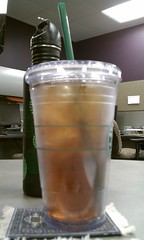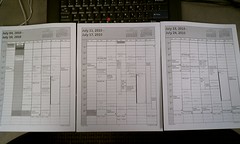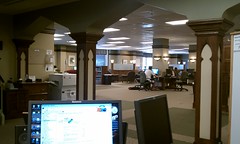Laura Westmoreland and Donna Coghill: “Walk-In Research & Writing Clinics: A Progress Report”
More in-depth than the library service desk, but less than what they’d get at the writing center, with the option to work with a librarian or writing consultant. They do it in two hour shifts that are regularly irregular, and each shift includes one librarian and one writing consultant. Last fall, they saw over two users an hour, but they weren’t coordinating with the writing center. In the spring, they coordinated with the writing center and reduced hours, which resulted in a decrease to under two users an hour. It might be seasonal, or something else about the service that wasn’t clicking as well with the students.
Erin White: “Mobilizing your library website”
Used analytics to determine the popular pages hit by mobile users. They paid close attention to what other libraries were doing with their mobile sites to avoid reinventing the wheel (i.e. NCSU Libraries). They also included a mini feedback form at the bottom of every page of the mobile site, and the message sent includes details about the device used. The most popular pages tend to be information pages like hours, events, and computer availability.
Olivia Reinauer: “Creating SLACers: The Formation of a Student Library Advisory Committee”
In 2006, a think team put together a recommendation to create a standing library advisory committee populated by students in order to have a better idea of the needs of current students. They copied liberally from VCU’s student advisory committee to create the charge and structure. One thing that VCU that was different was actually paying the students an honorarium, so they did that, either as cash or in the form of a gift card. They meet once a month to discuss ideas gathered from colleague’s work and go through the suggestions from the suggestion box, using the students as a sounding board. They also have guest speakers come and talk about things happening in the library, which the students like because it makes them feel engaged. Some issues involve getting them to do things outside of the meetings and providing more enticing compensation.
Abiodun Solanke: “Did you find my…?: Lost and Found Issues at UR Library”
Students leave physical and electronic materials all over the library, from books and clothing to unsaved documents on public computers. When we find the items, they are happy, and of course disappointed if not found. The student activities also keep lost and found items. If the item is not financial or an ID, they take photos and display them on the lost and found cart, along with “safer” physical items like clothing and books. If the items are never claimed, we repurpose them for use locally or send them to other organizations. Before that happens, several attempts are made to locate the owners and contact them.
Carrie Ludovico: “LibGuides for Foodies”
Using LibGuides to engage with the community. The campus has a strong green emphasis, from bikes to hybrid parking to a community garden. The newest benefit is a CSA option for employees from June – September for full and half shares that are delivered on campus, and it has been more popular than the organizers expected. So, they created a LibGuide to highlight interesting and supportive resources. The most used tab is the scholarly and government resources, more than books, cookbooks, and recipes.
Betty Dickie: “Read This!”
Anything by Christopher Moore, for certain. David Maine tends to take Bible stories and rewrite them in interesting ways. A Canticle for Leibowitz – the library plays an important role. Alessandro Boffa’s You’re an Animal, Viskovitz! is small but mighty. Louise Penny has gotten good reviews for good reason – recommended for murder mystery fans who like good stories and character development.
Carol Wittig: “Boatwright Knitters”
They meet one day a week at lunch. It encourages home/work balance, improves morale, addresses the whole person beyond the job, increases cross-campus outreach, and builds bridges to reach diverse groups. You can involve the whole staff by “sponsoring a knitter” to pay for the yarn. They have a Ravelry group, a blog, and a set of Flickr photos of projects. Right now, they are a student organization, but don’t have enough student participation, so they’re working on outreach in that area. They’ve done charity projects like Knit One To Save One and caps for chemo.
Travis Smith: “The End”
There are many negative connotations about “the end,” so he wrote a poem. You’ll have to ask him for a copy.




